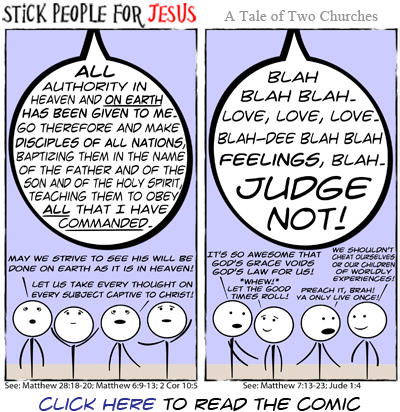
Is it ever appropriate to speak harshly?
Is it ever appropriate to speak in an irreverent tone?
Is it ever appropriate to speak sarcastically?
Is it ever appropriate to speak in a cutting, sometimes intensely critical manner?
The short answer to each of these questions is: Yes.
Not only is it sometimes appropriate to speak in such ways, but it can be necessary, good and loving to do so…assuming a biblical understanding of things like “good” and “loving” as opposed to the soft, fluffy counterfeit versions that define our culture today.
Moreover, it can be unloving, unkind, and even quite hateful to refrain from the use or encouragement of these approaches when they are called for.
The trick there, of course, is rightly defining when they are called for.
But before we can master that trick, we must first acknowledge that it exists and that it is worth mastering as one of the many challenges we are commanded and equipped to conquer in accordance with the Gospel-fueled Great Commission.
Far from being “beneath” a Gospel-centered mind, mastery of hard things like humor, sarcasm, and harsh, critical language is part and parcel of the Christian mandate.
It is in this context that I’d like to examine the question: Can snarky language be legitimate language from a Christian worldview perspective.
Our, put more simply: Is inherently bad to be snarky?
Before going on, let’s be plain about a couple of key (and related) points:
- The vast majority of what would reasonably be categorized as snarky language or behavior as practiced these days is sinful, and is therefore indefensible. So it is that I am in no way here making either A) a general defense of snark or B) a defense for any of the 99.9% of practiced snarkiness that is clearly (or very likely) unbiblical.
. - As with many other particularly hard to handle blessing from God, like humor or sexuality, our use of harsh, pointed, critical, sarcastic language tends to be very poorly executed, to say the least. Nothing I am about to write here (or am thinking in my head) is intended to give anyone (myself included) anywhere at any time any cover whatsoever against the obligation that we all have to test every thought (including those expressed in this post) by the perfect light of the whole counsel of the Word of God. If there is an appropriate context for the use of snarky language, then we must be diligent in constantly testing to see whether any particular expression of snark actually meets the biblical criteria for being a good and proper thing.
With this initial bit of explanation in hand, and with a desire to take every thought – including every snarky thought – captive to Christ as we have been commanded and equipped to do through His Spirit and Word, let’s move on to an examination of the concept of snarkiness.
Before rolling any further and explaining exactly what I mean by a phrase like “appropriately snarky”, let’s pause to securely nail down two simple, clear biblical principles that will explain much about what I am not advocating as appropriate:
- Anything we think or do out of self-centered pride or in defense of our ego is not appropriate. It is sinful. It is evil. And it is bad. Therefore, any snarky expression that is made out of self-centered pride or in defense of our ego is inherently indefensible.
. - Anything we think or do out of hatred for another person (image-bearer of God) is not appropriate. It is sinful. It is evil. And it is bad. Therefore, any snarky expression that is made out of hatred for another person is inherently indefensible.
These two simple (though often remarkably challenging in practice) tests, when applied, will sweep aside the vast majority of snarky expression, revealing them to be the evil things that they are.
With that much clear, let’s move on to defining terms, beginning with “snarky” itself.
First off, as is typical with these pesky things we know as words, there are a variety of ways to accurately define “snarky”. Some attributes of the term as represented in some definitions would qualify as inherently bad and therefore something that Christians ought to avoid and oppose. Even so, most attributes of the term as represented in most definitions would not qualify for such categorization or treatment. So when we use a term like “snarky” in the context of examining a thing to determine weather or not it is inherently good or bad (to be very general about it), it’s important for us to know exactly what we mean and what we don’t mean by snarky.
Let’s be loud and clear on one point: A “snarky” thought or expression that harbors any inherently sinful attribute (and we’ll get into more detail on that later) is a thought or expression that Christians should not entertain, much less utter or promote.
And at the same time, a “snarky” thought or expression that does not harbor inherently sinful attributes is a thought or expression that a Christian may entertain, utter, or promote in good conscience. This is not to say that each thought or expression in this category should be entertained, uttered, or promoted, but, as Scripture seems to make very plain (and we’ll definitely get more into this later), some of these “snarky” thoughts and expressions are not only allowable, but necessary, good, and loving.
Which brings us neatly to a convenient point at which to pause and contemplate the distinction between biblical concepts of love and niceness as they contrast with and expose modern uses of the same terms. (For a demonstration of the importance of these distinctions, please read It’s all fun and games…’til someone actually defines Christianity.)
In order to keep this post from growing into something downright gigantic, I’m not going to dive deep into many of the seemingly countless examples and elaborations that could be addressed with regard to these distinctions, but I do want to reference a core point that was very helpful for me in this context – a point that I’ve now heard from numerous pastors on the subject of “niceness” and “love” in action (particularly speech), that being: Each and every word uttered by Jesus was a word uttered by the very Incarnation of true love.
When Jesus speaks, True Love speaks.
When Jesus says a thing, it is loving.
Always.
Each and every time.
When Jesus corrects, it is always loving – no matter how harsh the language.
When Jesus rebukes, it is always loving – no matter how clearly the language is known to “hurt the feelings” of those who hear it.
When Jesus confronts, it is always loving – no matter how offended the hearers of His words may be or how many “bridges are burnt” (from a human perspective) in the process.
The Holy Spirit moves and records His movement through many, many others as well (which is greatly helpful for those who somehow view Jesus as disqualified from being a usable reference point or model in this context) in order to demonstrate and model many meaningful truths with regard to the good and proper use of very harsh, very critical, very cutting, and even at times very sarcastic language, however much said language may offend our modern sensibilities where concepts like “nice” and “loving” are concerned.
When Paul or John or Elijah or Jesus speaks, they are telling us something important about speech.
Whatever they are saying, it matters.
And how they’re saying it matters, too.
When we’re commanded to test all things (1 Thessalonians 5:21) in light of the perfect, sufficient whole counsel of the Word of God (2 Timothy 3:16-17), we need to be willing to do just that in each and every area of life, no matter how many long unchallenged assumptions and comfortable presuppositions we may have to dig up and kick around in the process. This all-encompassing call to test everything by the light of the whole counsel of God’s Word and take every thought captive to Christ (2 Corinthians 10:5)certainly covers and includes the testing of our personal preferences, traditions, styles, and sensibilities where things like language (and specific meanings of specific terms in language) are concerned.
Personal preferences are fine. There’s nothing inherently evil about the idea of you or I preferring and enjoying some things over others.
Personal styles can be perfectly fine in the same sense.
The same goes for personal tastes.
Based on what has been recorded by God for us in Scripture, the Apostle John and the Apostle Paul seem to have had substantially divergent styles, preferences, and the like. They seem to have been very different people, personality wise.
And that’s great!
That’s part of the beauty of what God is showing us about good, proper, healthy, and beautiful diversity!
It is worth noting that God does this in stark juxtaposition with various movements from “back in the day” all the way up to the present – some super conservative and some super liberal – all aimed at trying to pressure us to conform with one person’s (or group of people’s) personal preferences regarding things like style and taste.
While all Christians are in the process of being conformed to Christ (as opposed to any particular Christian), this does not mean that we are being conformed to one particular set of preferences or personality traits that are held by a particular person (or group) within the larger group comprising His people.
While we are being conformed to His attributes as He has defined them in His Word, we are not all being conformed to like the same musical instruments equally. Or the same food equally. Or the same art equally.
Or the same language or literary style equally.
You may like sports a lot. You may like sports a little. You may not like sports much at all.
You may like one particular sport a whole lot and another not a bit.
You may like novels. You may prefer biographies. You may enjoy sci-fi. Or you may not really care much for any of that stuff.
It’s okay.
It really is.
It’s okay if you like sharper, more pointed humor than the next guy. It’s okay if you enjoy fantasy literature much more than the person sitting next to you at any given moment.
And by “okay”, I mean okay for both parties involved in each illustration.
You can be all about Rocky Road while your friend nextdoor is all about the plain vanilla.
And that’s fine.
There is no problem inherent in that.
The same principle really does apply to things like linguistic styles and preference.
It’s important for us to remember this, lest we cave to the completely normal (but still not good) inclination that we inherently have to unduly nudge others toward conformity with our personal preferences. This nudging can be very bad and destructive, especially when we do it by conflating our personal preferences with the Word of God in a way that has us superimposing our preferred understanding of a thing over and above what the whole counsel of Scripture may have to say on the same thing, and then presenting that thing (our superimposed personal preference) as “the Word of God” on the matter.
This extra-biblical approach to preference often influences some groups to dress “too much alike”, for example.
Please note that we’re all very vulnerable and prone to this.
We very often do it out of ignorance, but we do it a lot either way.
One common contemporary manifestation of this approach comes from within the camp of those I consider to be “my people” (Reformed Christian conservatives). I’ve heard it described as the “nicer than Jesus” complex.
While the idea of being nicer than Jesus is obviously farcical on its face, we (often unconsciously) embrace it in practice, not by vigorously pursuing “niceness” or “love” in their full splendor and diversity as reflected in Scripture, but instead by superimposing our preferences and our understanding of what we believe “nice” and “loving” ought to mean over and above what those things actually look like as modeled and described in the whole counsel of the Word of God.
Remember: We are all prone to this. When I reference our tendency to superimpose or assume “our preferences and our understanding” of things, we need to remember that “our understanding of things” is all that we have to work with at any given moment, right? We only know what we know at any given time (which is why God gives us other people and challenging situations to shake and sharpen us), so let’s keep that in mind as we continue this examination and let’s definitely keep it in mind as we interact with others who don’t yet know what we think they ought to know. (For more on this important point, please read: Never forget that apart from God’s grace you and I are complete morons.)
Now back to our “nicer than Jesus” problem: The conflation of our preferences (as to what things like “nice” and “loving” mean) with what the whole counsel of God’s Word defines them to be in every detail provided is a profoundly dangerous and potentially very destructive thing. When we make any sub-biblical definition or approach to “love” or “nice” the standard by which we test others for fidelity to Christ, we are in a very bad place, and we’re putting them there, too.
If we think that the hard, harsh, challenging, cutting, critical, mocking, and/or sarcastic things plainly spoken by Paul, John, Elijah or Jesus are somehow not to be taken as good, proper, loving, honorable, and productive at the same time, then we are missing something profound and fundamental to rightly understanding what “nice” and “loving” really are, particularly as they relate to language.
Again the reminder: None of this (and none of what I am going to share from here on out) is in any way aimed at pitching the notion that because John or Paul or Jesus said hard, critical, mocking things, then somehow you or I are entitled to say these sorts of things any time we get the urge.
Nope.
Not at all.
That’s not what I’m advocating here.
Get it?
Got it?
Good.
I know that many may accidentally interpret things that way. I also know that there are many who will want to spin it that way, so I appreciate your patience once again as I repeat this crystal clear and very important clarification from time to time.
Now back to “snarky”…
With the aforementioned groundwork in mind, let’s get back to the main point by establishing a definition of “snarky” as I intend the term to be understood through the meat of this post.
En route to that definition, let’s consider a handful of definitions offered up by some commonly cited sources. I will provide additional clarification of terms used in these definitions in orange type. I know that this might seem like a bit much, but precision matters when it comes to defining terms, and I want you to clearly understand both what I mean and what I don’t mean by “snarky” as I make the case for it’s potential appropriateness and value to the Kingdom of God, so, once again, I greatly appreciate your patience with this sometimes trudging process.
That said, away we go to the happy land of online dictionaries…
Snarky is defined this way by the Oxford Dictionary:
sharply critical; cutting; snide: [With “snide” often meaning “derogatory or mocking in an indirect way”.]
Snark is defined this way at Merriam-Webster:
An attitude or expression of mocking irreverence and sarcasm. [With “sarcasm” often defined as “a sharp and often satirical or ironic utterance designed to cut or cause pain”.]
Snark is defined this way thoughtco.com:
Abusive and sarcastic speech or writing–a form of invective. [With “invective” often meaning insulting, abusive, or highly critical language – though not necessarily any particular combo of the three.]
Depending on the speaker, subject, and audience, snark may be perceived as either witty or asinine, sophisticated or sophomoric. Adjective: snarky.
With these reference points in mind, here’s what I’m meaning when I describe “Snarky” as something that can be potentially good from a biblical worldview perspective…
Snarky: To employ a sometimes crude expression of mockery, irreverence, sarcasm, and/or cutting criticism, which may reasonably be expected in many instances to shock, offend, and/or “trigger” its hearers.
While this is not meant to be a perfect or comprehensive definition, it should help accomplish the goal of clarifying what I mean and what I do not mean by this “potentially good snarky” think I’m talking about here.
The key inherent components or attributes in my definition for “snarky” are: Mockery, irreverence, sarcasm, cutting criticism and sometimes crudeness. Please note the “and/or” preceding these in the definitions, as I am definitely not saying that “snarky” as I am approaching it here requires the presence of all of these attributes. What I am saying is that it will generally have at least one of them.
My definition also proclaims that many (though not all) expressions of this “snark” will predictably inspire shock and offense in those who hear it.
So with these attributes and anticipated responses from hearers of this “snarky” stuff in mind, let’s consider several hard statements made by men of God in Scripture to see whether they fit into this definition of “snarky”.
First off let’s consider Elijah’s interaction with the prophets of Ball in 1 Kings 18:25-27 (with bold emphasis added):
“Then Elijah said to the prophets of Baal, “Choose for yourselves one bull and prepare it first, for you are many, and call upon the name of your god, but put no fire to it.” And they took the bull that was given them, and they prepared it and called upon the name of Baal from morning until noon, saying, “O Baal, answer us!” But there was no voice, and no one answered. And they limped around the altar that they had made. And at noon Elijah mocked them, saying, “Cry aloud, for he is a god. Either he is musing, or he is relieving himself, or he is on a journey, or perhaps he is asleep and must be awakened.”
Okay, do you see any crudeness there? (Hint #1: False god. Hint #2: Potty break. You take it from there…)
How about mockery?
Any detectible irreverence?
Any sarcasm?
And howsabout cutting criticism?
Do you think that maybe those hearing Elijah’s words might have been shocked, offended, and/or triggered?
Just maybe?
Ya think?
Okay, on to the next one…
Let’s consider the Apostle Paul, who actually said out loud (and wrote down under the Spirit’s direction) that he wished certain men would cut their ___ off, which is expressed in different ways depending on your English Bible translation. Here are four examples:
Galatians 5:12 (ASV): “I would that they that unsettle you would even go beyond circumcision.”
Galatians 5:12 (NKJV): “I could wish that those who trouble you would even cut themselves off!”
Galatians 5:12 (NASB): “I wish that those who are troubling you would even mutilate themselves.”
Galatians 5:12 (ESV): “I wish those who unsettle you would emasculate themselves!”
So, do you detect any feint hints of crudeness lingering about? Look hard…re-read it if you need to.
Howsabout mockery?
Any irreverence? Any o’ that in there?
Any signs of *ahem* cutting sarcasm?
And do you think that maybe, just maybe, someone hearing about Paul wanting certain guys to cut their ___ off might, just maybe, be shocked, offended, and/or triggered?
While you kick that around, let’s move on to the next example, this time directly from the Lord as recorded by the Lord in Judges 10:11-14:
And the Lord said to the people of Israel, “Did I not save you from the Egyptians and from the Amorites, from the Ammonites and from the Philistines? he Sidonians also, and the Amalekites and the Maonites oppressed you, and you cried out to me, and I saved you out of their hand. Yet you have forsaken me and served other gods; therefore I will save you no more. Go and cry out to the gods whom you have chosen; let them save you in the time of your distress.”
Any mockery here?
Any irreverence?
Any sarcasm?
Any chance that someone hearing these things might be shocked or offended?
Remember once again: None of this is intended as anything remotely resembling a blanket approval or defense of mocking, irreverent, crude, or sarcastic language. Don’t let that fact slip your mind at any point in this presentation.
Now let’s move through two examples from God the Son, beginning with Jesus’ well known “Get behind me, Satan!” response to Peter as recorded in Matthew 16:23.
Are any attributes of “snarky” to be found in that statement?
Might a statement like “Get behind me, Satan!” be expected (or perhaps intended) to shock or offend?
Just wondering…
Later in Matthew (23:13-33 with emphasis added), we see Jesus share the following sentiments (which are, as always, a perfect expression of true love):
“But woe to you, scribes and Pharisees, hypocrites! For you shut the kingdom of heaven in people’s faces. For you neither enter yourselves nor allow those who would enter to go in. Woe to you, scribes and Pharisees, hypocrites! For you travel across sea and land to make a single proselyte, and when he becomes a proselyte, you make him twice as much a child of hell as yourselves.
“Woe to you, blind guides, who say, ‘If anyone swears by the temple, it is nothing, but if anyone swears by the gold of the temple, he is bound by his oath.’ You blind fools! For which is greater, the gold or the temple that has made the gold sacred? And you say, ‘If anyone swears by the altar, it is nothing, but if anyone swears by the gift that is on the altar, he is bound by his oath.’ You blind men! For which is greater, the gift or the altar that makes the gift sacred? So whoever swears by the altar swears by it and by everything on it. And whoever swears by the temple swears by it and by him who dwells in it. And whoever swears by heaven swears by the throne of God and by him who sits upon it.
“Woe to you, scribes and Pharisees, hypocrites! For you tithe mint and dill and cumin, and have neglected the weightier matters of the law: justice and mercy and faithfulness. These you ought to have done, without neglecting the others. You blind guides, straining out a gnat and swallowing a camel!
“Woe to you, scribes and Pharisees, hypocrites! For you clean the outside of the cup and the plate, but inside they are full of greed and self-indulgence. You blind Pharisee! First clean the inside of the cup and the plate, that the outside also may be clean.
“Woe to you, scribes and Pharisees, hypocrites! For you are like whitewashed tombs, which outwardly appear beautiful, but within are full of dead people’s bones and all uncleanness. So you also outwardly appear righteous to others, but within you are full of hypocrisy and lawlessness.
“Woe to you, scribes and Pharisees, hypocrites! For you build the tombs of the prophets and decorate the monuments of the righteous, saying, ‘If we had lived in the days of our fathers, we would not have taken part with them in shedding the blood of the prophets.’ Thus you witness against yourselves that you are sons of those who murdered the prophets. Fill up, then, the measure of your fathers. You serpents, you brood of vipers, how are you to escape being sentenced to hell?”
Do you think that perhaps it might be reasonable to expect someone hearing these words to possibly be at least a little shocked or offended?
Or maybe a lot?
Maybe even a whole lot?
Is there any mockery present in this passage that might help explain the potential shock or offense of those hearing these words?
Is there any cutting criticism to be found?
Any irreverence?
Now let’s move on to God’s supremely harsh dressing down of Job, which begins in Job 38 and literally goes on for chapters after that. To get just a small sample taste of what the Lord said to Job there, here’s the intro as recorded in Job 38:1-13 (with emphasis added):
“Then the Lord answered Job out of the whirlwind and said: “Who is this that darkens counsel by words without knowledge?
Dress for action like a man; I will question you, and you make it known to me.
Where were you when I laid the foundation of the earth? Tell me, if you have understanding. Who determined its measurements—surely you know! Or who stretched the line upon it? On what were its bases sunk, or who laid its cornerstone, when the morning stars sang together and all the sons of God shouted for joy?
Or who shut in the sea with doors when it burst out from the womb, when I made clouds its garment and thick darkness its swaddling band, and prescribed limits for it and set bars and doors, and said, ‘Thus far shall you come, and no farther, and here shall your proud waves be stayed’?
Have you commanded the morning since your days began, and caused the dawn to know its place, that it might take hold of the skirts of the earth, and the wicked be shaken out of it?“
As already mentioned, it goes on and on and on from there, with the Lord berating, belittling, mocking, cutting, and sarcastically pummeling Job. While many are inclined to at least try to dismiss this example and others provided directly by God as being somehow irrelevant as a model through which we might gain a more accurate understanding of what the proper use of God’s creation of language looks like in practice, it’s more than a little suspicious that scores of Scriptural examples of godly men using similarly abrasive, cutting language are also often dismissed out of hand as not being men we ought to emulate or learn from, at least where their understanding and use of language is concerned.
Elijah, David, John, Paul, and many other godly men who clearly, thoughtfully, and purposefully use snarky language in a good, productive, and God glorifying manner are just sort of…ignored.
I suggest that we stop ignoring them on this or any other subject on which they may have spoken either directly or by example.
With so many examples of godly men using snarky language well documented (though only a handful of those examples have been provided here), we are well served to also note that Scripture provides many examples of improper use of snarky language. I won’t bother listing examples of that here, trusting that the fact of such examples is not in dispute.
I will, however, note that in these two sorts of examples – the godly use of snarky language and the ungodly use/abuse of the same – we are blessed with yet another white-on-black juxtaposition. The God-given opportunity to witness, explore, and learn from that purposefully provided contrast is something that we dare not ignore.
So let’s look at the way these men – flesh and blood men who walked and talked right here on planet earth – let’s look at the way these men used language well to the glory of God and the advance of His Kingdom. Let’s look at everything they said and the way they chose to say it.
Let’s learn from those examples rather than hide from them.
Let’s grow by pursuing a better understanding of everything they said and the manner in which they said it.
And let’s learn and grow from those examples.
Even (and especially) when that growth challenges our long held assumptions and pet preferences.
Even when that growth makes us uncomfortable.
Or, put another way: Even when that growth offends us.
(As this is already quite a long post and I have a fair bit more to add, I will cut things off for now here and continue in Part 2 in the coming days, Lord willing. In the meantime, thank you for your interest in these things and thank you for taking the time to read/endure my sometimes rambling thoughts.)
If you know of anyone who might appreciate this post, please share it. If you’d like to see posts like this continue, please click here to help.
Please check out our video channel and our news satire site.
You can also help support the Fire Breathing Christian mission by checking out these books:
Stupid Elephant Tricks – The Other Progressive Party’s War on Christianity takes a painful but much needed look at how Christ-less “conservatism” has captivated Christians and co-opted them into helping march the culture ever deeper into darkness:
_____________________________________________________
The Beginning of Knowledge: Christ as Truth in Apologetics is an approachable, easy to read introduction to Christ-centered apologetics:
 _____________________________________________________
_____________________________________________________
Apathetic Christianity: The Zombie Religion of American Churchianity explores the tragic true horror story of all-American dead religion masquerading as Christianity:
_____________________________________________________
On Education is a compilation of some of the most provocative and compelling Fire Breathing Christian articles on the subject of children’s education:
_____________________________________________________
There Is No “God-Given Right” To Worship False Gods is a compilation of some of the most provocative Fire Breathing Christian articles on the subject of America’s embrace of a satanic approach to religious liberty:
_____________________________________________________
Fire Breathing Christians – The Common Believer’s Call to Reformation, Revival, and Revolution is the book that first presented the FBC mission to apply the Gospel-fueled Great Commission in every realm of God’s creation:
_____________________________________________________
An alternate white cover version of Fire Breathing Christians is available:
_____________________________________________________
There is also an alternate black cover version of Fire Breathing Christians:
Finally, here are a few good intro/reminder links for those of you who are new to Fire Breathing Christian and curious about exactly what’s goin’ on ’round here:
What are you, some kind of [insert label here] or something?!
What’s with that shark-fishie graphic thing?
Intro to Fire: The Power and Purpose of the Common Believer
When the Bible gets hairy. (Or: Is it right for men to have long hair?)
And especially this one: Never forget that apart from God’s grace you and I are complete morons.
Thank you for your support!












